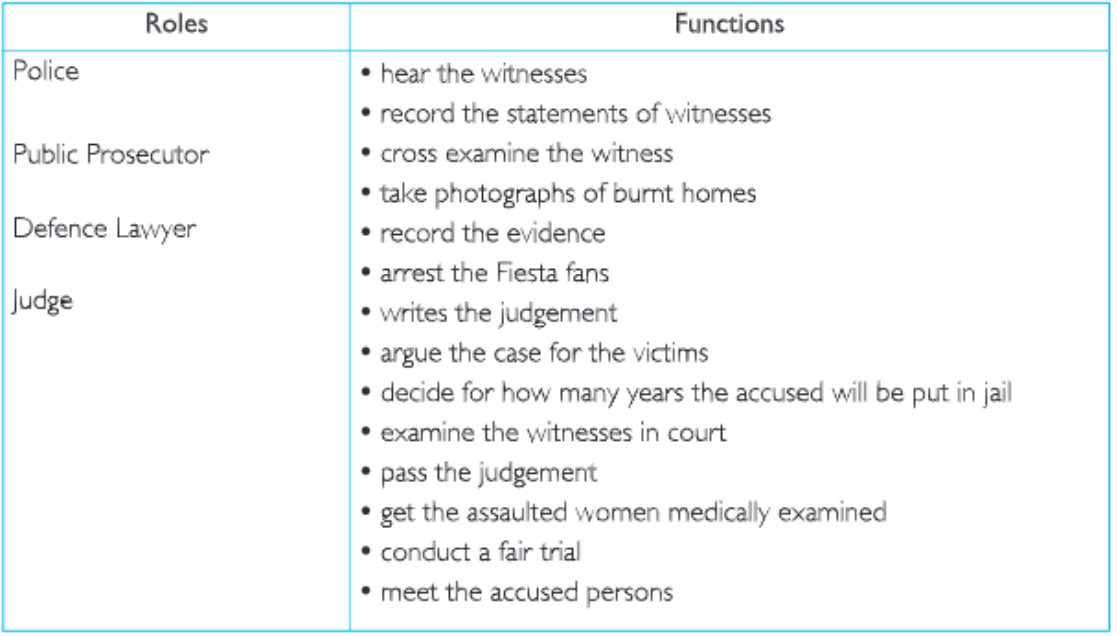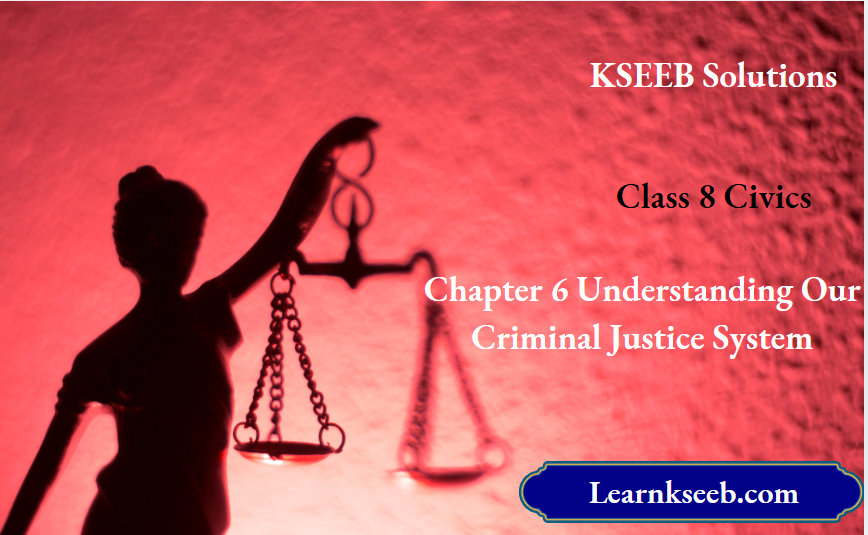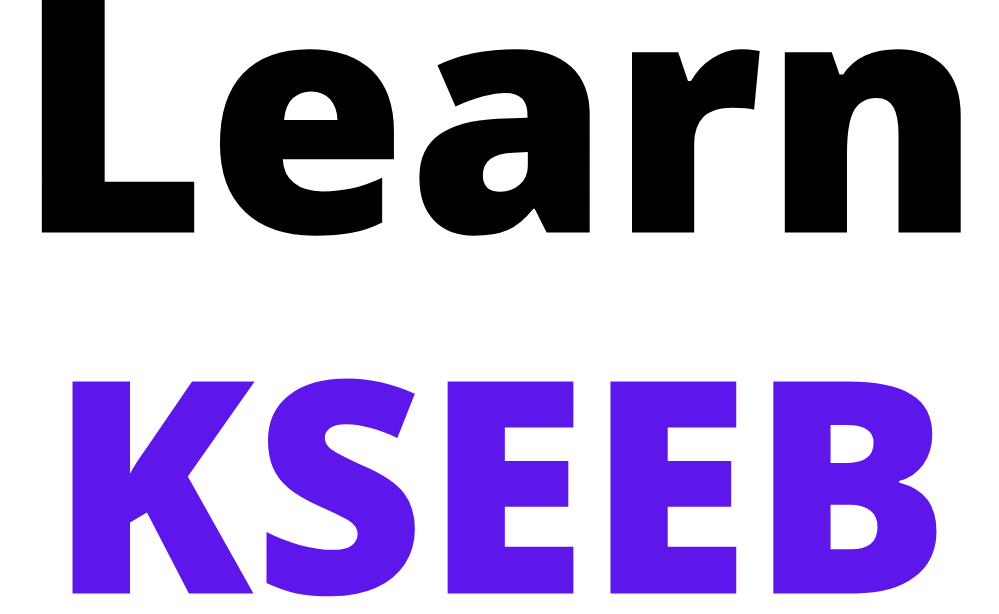KSEEB Solutions for Class 8 Civics Chapter 6 Understanding Our Criminal Justice System Text Book Questions
In a town called Peace Land, the supporters of the Fiesta football team learn that the supporters of the Jubilee football team in the nearby city about 40 km away have damaged the ground on which the Final between both teams is to be held the following day. A crowd of Fiesta fans armed with deadly weapons attacks the homes of the supporters of the Jubilee football team in the town. In the attack, 10 men are killed, 5 women are gravely hurt, many homes are destroyed and over 50 people injured?
Imagine that you and your classmates are now part of the criminal justice system. First divide the class into the following four groups of persons.
(1) Police
(2) Public Prosecutor
(3) Defence Lawyer
(4) Judge
The column on the right provides a list of functions. Match these with the roles that are listed on the left. Have each group pick the functions that it needs to perform to bring justice to those who were affected by the violence of the Fiesta fans. In what order, will these functions be performed.

Kseeb Class 8 Civics Chapter 6 Understanding Our Criminal Justice System Solutions Pdf
Now take the same situation, but ask one student who is a supporter of the Fiesta Club to perform all the functions listed above. Do you think the victims would get justice if only one person performed all of the functions of the criminal justice system? Why not? State two reasons why you believe that different persons need to play different roles as part of the criminal justice system.
Answer. Police, Public Prosecutor, Defence Laywer and Judge will perform their functions in the following order
Police:
- Arrest the Fiesta Fans
- Take photographs of burnt homes
- Get the assaulted women medically examined
Public Prosecutor:
- Examine the witnesses in Court defence Lawyers:
- Meet the accused persons
- Cross examine the witnesses
- Argue the case for the victim
Judge:
- Conduct a fair trial
- Record the statement of witnesses
- Record the evidence
- Pass the judgement
- Decide for how many years the accused will be put in Jail
- Write the judgementFor a fair trial and to do justice, it is essential that all the four types of functions should be performed by four different persons. If all the four functions are performed by one person, then the victim would not get justice. For delivering justice, al the four types of functions of Criminal Justice should be performed by four different persons.

Sslc Class 8 Civics Understanding Our Criminal Justice System Question And Answers
Understanding Our Criminal Justice System Text Questions
Question 1. Why do you think there is a rule that confessions made during police custody cannot be used as evidence against the accused?
Answer Confessions made during police custody cannot be used as evidence against the accused because the accused could have confessed under pressure or tortured at the time of arrest by the police.
Question 2. What did the judge say in Shanti’s case after hearing the testimony of all the witnesses?
Answer After hearing the testimony of all the witnesses, the Judge gave the judgement and declared Shanti not guilty.
KSEEB Class 8 Civics Solutions For Understanding Our Criminal Justice System
Understanding Our Criminal Justice System Very Short Answer Type Questions
Question 1. Who are the key players in the Criminal Justice system?
Answer
(1) Police
(2) Public Prosecutor
(3) Defence Laywer
(4) Judge.
Question 2. If a person is unable to appoint a lawyer due to poverty, then who provides for a lawyer?
Answer Under Article 39 A of the Indian Constitution, the state is responsible for providing a lawyer to every citizen who is unable to appoint the sane due to poverty.
Question 3. Write the full form of FIR and who records it?
Answer Full form of FIR is First Information Report. The power and responsibility to record an FIR rests with the Police.
Question 4. Who decides whether the arrested person s guilty or not?
Answer Court of law decides whether the arrested person is guilty or not
Kseeb Class 8 Civics Understanding Our Criminal Justice System Textbook Solutions
Question 5. In the court, who represents the case on behalf of the state?
Answer A Public Prosecutor conducts the prosecutions on behalf of the state.
Question 6. Which Article of the Indian Constitution gives every person a Fundamental Right to be defended by a lawyer?
Answer Every person has a Fundamental Right to be defended by a lawyer under- Article 22 of the Indian Constitution.
Question 7. If a person is arrested as accused then who grants him bail? Answer The court grants bail to the accused.
Understanding Our Criminal Justice System Short Answer Type Questions
Question 1. What do you understand by the terms fair trial?
Answer According to the Indian Constitution, a fair trial is to be provided to any person charged with a crime. It is the duty of the Judge to ensure fair trial. In simple words, a fair trial means that a person charged of crime should be given full opportunity to prove his/her innocence. A far trial ensures that Article 21 of the Constitution is upheld.
Question 2 What is the role of the Judge?
Answer The Judge is the most important key player in the system of Justice. Fair trial is the basic principle of impartial justice. It is the duty and responsibility of the Judge to conduct a fair trial and to do justice impartially. The Judge hears all the witnesses and records their evidence. On the basis of evidence, the Judge decides whether the accused is guilt)’ or innocent. If the accused is found guilty then Judge announces the sentence in accordance with the provision of law.
Question 3 What do you understand by Criminal Courts?
Answer Criminal Courts are those courts that deal with criminal cases. At the apex of the hierarchy of criminal courts stands the courts of session Judge. The Session Court is the highest criminal court j in the district The Session Judge can try criminal cases involving murder and other serious offences i only committed to it by a First class magistrate.
Question 4 What is the role of the Public Prosecutor?
Answer Public Prosecutor is another key player in the criminal justice system. A criminal offence is regarded as a public wrong as it is not only committed against a particular individual, but against the whole society i.e. against the state. Public Prosecutor is a lawyer who represents the state in criminal cases. When Police files a case in the court, the role of Public Prosecutor begins. He conducts the prosecution on behalf of the state. He presents complete facts and evidence regarding the case impartially. The Public Prosecutor should perform his duties honestly and sincerely.
Understanding Our Criminal Justice System Class 8 Civics Kseeb Important Questions
Understanding Our Criminal Justice System Long Answer Type Questions
Question 1. Explain briefly the essential elements of a fair trial.
Answer Following are the essential elements of a fair trial:
- The trial should be held in an open court Public should be allowed to be present in the court
- The trial should be held in the presence of the accused.
- The accused should be defended by a defence lawyer.
- if accused is poor, then a defence lawyer should be provided by the court at the government’s expense.
- The Defence lawyer should be given full opportunity to cross-examine all the prosecution witnesses.
- The accused should be considered innocent till it is proved beyond any reasonable doubt that if accused is guilty.
Question2. How is personal liberty protected under the Constitution?
Or What are the Fundamental Rights which are guaranteed to every individual under Article 22 of the Indian Constitution?
Answer Articles 20-22 aim at protecting the individual’s life and personal liberty.
- Article 20 lays down that no person shall se convicted of any offence except for violation of a law in force at the time of the commission of the Act charged as offence.
- No person shall be subjected to a penalty greater than that which might have been inflicted under the law in force at the time of the commission of the offence.
- Article 21 provides that no person shall be deprived of his life or personal liberty except according to the procedure established by law.
- No person can be arrested in any arbitrary manner, nor can he be detained for an indefinite period. Art. 22 provides that whenever a person has been detained, he must be informed, as soon as may be, of the grounds for such an arrest. Secondly, the detained person shall have the right to consult and be defended by a lawyer of his own choice. Thirdly, he must be produced before the nearest magistrate within a period of 24 hours of such an arrest.
- Confessions made in police custody cannot be used as evidence against the accused.
Karnataka Sslc Class 8 Civics Chapter 6 Solutions In English
Question 3. Explain the specific requirements and procedures that the police and other agencies have to
follow for the arrest, detention and interrogation of any person.
Answer Specific requirements and procedures have been laid down by the Supreme Court of India that are required to be followed by the police and other agencies for the arrest, detention and interrogation of any person. These guidelines are known as D.K. Basu guidelines. Main guidelines are as follows:
- The police officer arresting or investigating should wear proper dress, name tags with their designations.
- When arresting an individual, a proper memo has to be prepared which should also clearly mention the t me and date of arrest. One family member of the person arrested should sign the Memo as witness. Moreover, the person arrested should sign the memo as Counter signed.
- The arrested person has a right to inform his friend or relative about his arrest.
- When the family members are living outside the district then police must notify the arrest within 8 to 12 hours after the arrest.
Kseeb Class 8 Civics Understanding Our Criminal Justice System Solved Exercises
Understanding Our Criminal Justice System Hots Corner
Question 1 . Explain briefly the role of the police in investigating a crime.
Answer The most important function of police is to investigate any complaint about the violation of law or crime. When any crime is committed, it becomes the duty of the police of that area to investigate the matter. An investigation includes recording of statements of the witnesses and collecting other related evidences connected with the crime. After investigation, if the police finds that the accused had committed the said crime, then a charge sheet is filed in the court But the police investigation must be conducted in accordance with the law and with full respect for human rights.
Question 2. What are the main functions of the police?
Answer
- To maintain law and order in its area. To prevent the crimes in its area.
- To register cases of theft, rape, murder, accident, etc.
- To investigate and take action on the cases within its own area.
Understanding Our Criminal Justice System Multiple Choice Questions
Question 1 A person who is tried by a court for a crime is called:
(a) Innocent
(b) Accused
(c) Criminal
(d) Witness
Answer (b) Accused
Question 2. Judge decides the case only on the basis of:
(a) Evidence
(b) Money
(c) Force
(d) Favour
Answer (a) Evidence
Question 3. Who decide whether the accused is innocent or guilty?
(a) Judge
(b) Police official
(c) Lawyer
(d) Public Prosecutor
Answer (a) Judge
Class 8 Civics Understanding Our Criminal Justice System Notes Karnataka Board
Question 4. Who registeres a F.I.R.?
(a) Police
(b) Judge
(c) Patwari
(d) Sarpanch
Answer (a) Police
Question 5. F.I.R. means:
(a) First Information Review
(b) First Information Report
(c) Firstly Informed Right
(d) All of these
Answer (b) First Information Report
Question 6 If a person is arrested, then who grants bail to the accused?
(a) Police
(b) Court
(c) Patwari
(d) Sarpanch
Answer (b) Court
Understanding Our Criminal Justice System Fill in the Blanks
Fill the blanks with appropriate terms in the following sentences:
- A criminal offence is regarded as a_wrong.
- The complaint has a legal right to get a free copy of the
- Police investigations always have to be conducted in accordance with
- ——–Of the Constitution guarantees to every arrested person some Fundamental Rights.
- ——-has to investigate any complaint about the commission of a crime.
Answer
- Public
- F-I-R-
- Law
- Article 22
- Police
